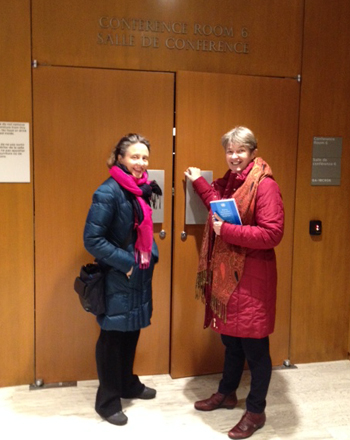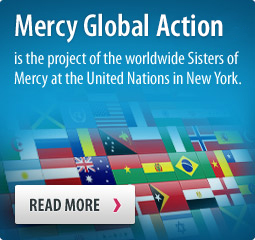
CSW59/Beijing+20 (2015) ‘Implementing the Beijing Platform for Action’ March 2015
Reports: April 02, 2015
'It was ‘gift’ to be able to participate in the 59th session of the UN Commission on the Status of Women (CSW) in New York in March 2015,' writes Denise Boyle fmdm, Assistant Director Mercy Global Action. Read her complete report below.

Introduction:
Participants gathered from all over the world to share the uniqueness of their culture with tremendous energy, wisdom and HOPE! The focus of this CSW was on progress made on the ‘Beijing Platform for Action’ that emerged from the Fourth World Conference for Women, held in Beijing, 1995. The twelve key areas of the ‘Platform’ were the foci for the UN side-events and parallel events organised by the NGO community. Eleven of the key themes or ‘critical areas’ are women focussed i.e. poverty; human rights; health; armed conflict; the economy; decision-making; institutional mechanisms; media; environment; violence against women; institutional mechanisms; with the twelfth area focussed on the ‘girl child’.
Initially progress made in the critical areas since 1995 was assessed; then the focus moved to looking forward. The global question is how to achieve gender equality and women’s empowerment in our lifetime? ‘UN Women’ concerned at the slow progress, are citing 2030 as the final end point to achieve these goals! They are putting great effort into these first five years i.e. 2015-2020; with specific targets that Governments with civil society should be accountable for achieving. Any ‘gaps’ re attaining full equality for women, will be targeted and addressed during the decade 2020-2030.
This year presents a unique opportunity to incorporate gender equality into the post 2015 Development Agenda. Right now ‘UN Women’ with NGOs are lobbying to ensure equal rights for women are an integral part of the Sustainable Development Goals (SDGs). In September when the Heads of Government gather in NY to confirm the SDGs, the plan is to lobby world leaders to re-commit to the achievement of the Beijing goals.
 |
| L-r: Aine O'Connor rsm and Denise Boyle fmdm about to enter a conference room at the UN |
Personal Reflection on CSW59: In terms of writing a report, it is impossible to capture the rich experiences that attendance at such a global event facilitates. What follows are some vignettes that hopefully reflect the atmosphere and principle learnings I gleaned from my participation in this important conference for women. A backdrop to these is my conversation with a beautiful older lady from Uganda, who spoke of the urgency of addressing root causes especially poverty, if we want to achieve gender equality. As we sat together our eyes met when one of the speakers said: ‘It’s impossible to eradicate extreme poverty – the greatest burden of which is on women – without eradicating extreme wealth!’
Vignette 1: ‘Continuing and New Challenges in the Quest to Eliminate Violence against Women’; Speaker: Ms. Rashida Manjoo, the UN Special Rapporteur / Independent Expert on ‘Sexual Violence Against Women’.
Sitting through this 90 minute session was a harrowing and extraordinary experience. Rashida is nearing the end of her mandate as the Special Rapporteur, so she used the opportunity ‘to speak her truth to power’! She began her presentation in silence showing 10 slides of women activists from different countries. All of them were murdered between November 2014 and February 2015, because they were working to eliminate violence against women (VAW) and girls. Rashida informed us that VAW is on the increase, to the extent that the World Health Organisation (WHO) has declared VAW a ‘global epidemic!
This fact was confirmed by the President of the ‘International Federation for Human Rights’*(FIDH): “Violence against women continues to rage across the world. Domestic violence, sexual violence, trafficking in women, ‘honour’ crimes, sexual slavery, forced marriage, female genital mutilation… All too often the perpetrators remain unpunished and the victims are unable to assert their rights”; International Women’s Day 2015. Speaking graphically of the horrors inflicted on women and the girl child through violence, Rashida said the UN has to take more responsibility to address this global epidemic. *
Visit the FIDH website
In summary Rashida* made the following points related to VAW:
1. There is need for a thorough analysis of the growth in VAW during the past 20 years.
2. Governments must review consequences of VAW, sickness, effect on children, work...
3. During her five year mandate she promoted ‘due diligence’ when reporting on country visits; maintaining her independence and therefore her protection of victims.
4. UN and Governments must acknowledge that VAW is an abuse of human rights, perpetrated by men (95%); therefore maximum financial support must go to women or girl victims.
5. It is absolutely unacceptable to tolerate VAW in the context of cultural norms
6. UN must commit to implementing what is in its own documents e.g. ‘Convention on the Elimination of all forms of Discrimination Against Women’ (CEDAW) etc
7. The UN must develop legally binding instruments that hold Governments to account!
* See reports of Rashida Manjoo to the UN Human Rights Council, especially 2013 and 2014.
Two parallel events linked ‘Eco-systems, Fossil Fuels, Extractivism and Women’s Experience’. The common thread was the valuable learning it is possible to glean from personal testimonies. Both events were co-hosted by the UN ‘Mining Working Group’ that Aine O’Connor rsm, Chairs out of the Mercy office in NY. Whilst listening to one of these testimonies’ I saw clearly the truth that the ‘rape and plunder of our natural world’ is mirrored in the rape and exploitation of women and girls!
1. The intricate, fragile link between the natural eco-system and human activity was explored in the first event: ‘nature knows what works’. Nina Simmos shared how women through their DNA ‘are standing in defence of life when opposing the extractives industry; because women are naturally for life.’ Ricki Ott, a marine toxicologist, spoke about her involvement with the court case against Exxon Valdez, for their oil spill in the Prince William Sound in Alaska, in 1989. Seeing the 30 million gallon oil spill from the air, Ricki knew it would alter the ecosystem of Prince William Sound forever! She made a personal vow there and then ‘to work upstream of oil spills, to help the USA transition off fossil fuels’.
Sr. Rebecca, PBVM, from Goa, told us about ‘Tribals’ who are leading the protest to ban mining in their rural area of India. They mobilised in an active protest because their homes were threatened, also their fertile land, precious water sources and traditional, community values.
2. In the second event a Sister from Peshawar, India, shared a similar story of protest by a local community, against the destructive practices of the mining company, PANEM. Tragically, it was the murder of Sr Valsa John Malamel in 2011, which mobilised the villagers to collective action. Sr became the villager’s interlocutor with PANEM following an MOU signed in 2006. In the ‘divide and rule’ tactics associated with mining companies, Sr Valsa disagreed with some villagers on how to use the compensation money for development. To hear how the community courageously continued to oppose the expansion of mining activities was inspirational!
 My final vignette is from a parallel event focussed on Human Trafficking (HT). Lynda Dearlove rsm, Director of ‘Women@theWell’ (W@W) in her presentation, brought the women who have been enslaved through HT, to ‘join us’ through a disturbing and thought provoking film. She emphasised the importance of viewing any response to HT, from the perspective of those who have been trafficked. Kevin Hyland, the UK ‘Independent Anti-Slavery Commissioner’ encouraged us to use the term ‘Modern Slavery’ (MS) instead of HT. He explained why, through sharing some horrific examples he has dealt with, involving the enslavement of young children, teenagers and adults. Kevin believes that improved care for victims of MS, who suffer huge trauma, is vital. It is also a means of gaining their support, without which it is impossible to apprehend and convict Traffickers.
My final vignette is from a parallel event focussed on Human Trafficking (HT). Lynda Dearlove rsm, Director of ‘Women@theWell’ (W@W) in her presentation, brought the women who have been enslaved through HT, to ‘join us’ through a disturbing and thought provoking film. She emphasised the importance of viewing any response to HT, from the perspective of those who have been trafficked. Kevin Hyland, the UK ‘Independent Anti-Slavery Commissioner’ encouraged us to use the term ‘Modern Slavery’ (MS) instead of HT. He explained why, through sharing some horrific examples he has dealt with, involving the enslavement of young children, teenagers and adults. Kevin believes that improved care for victims of MS, who suffer huge trauma, is vital. It is also a means of gaining their support, without which it is impossible to apprehend and convict Traffickers.
Writing the above had evoked the kaleidoscope of images and memories from the seven days I spent attending CSW sessions. Most vivid are memories of the women I met on queues, or spoke to between or before and after sessions. It is their stories, courage and determination, to make a better world for their children, that is prompting me to take concrete action, to work towards eliminating violence against women / girls!
Messages to: Denise Boyle fmdm - Assistant Director Mercy Global Action




